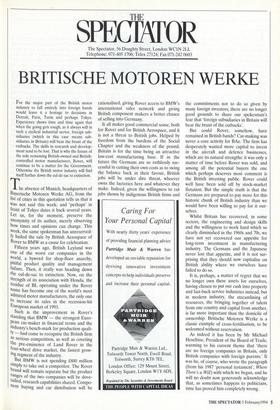SPE T akTOR
The Spectator, 56 Doughty Street, London WC1N 2LL Telephone: 071-405 1706; Telex 27124; Fax 071-242 0603
BRITISCHE MOTOREN WERKE
For the major part of the British motor industry to fall entirely into foreign hands would leave it a hostage to decisions in Detroit, Paris, Turin and perhaps Tokyo. Experience shows time and time again that when the going gets rough, as it always will in such a cyclical industrial sector, foreign sub- sidiaries (which in this case means sub- sidiaries in Britain) will bear the brunt of the cutbacks. The skills in research and develop- ment tend to be lost. That is why the future of the sole remaining British-owned and British- controlled motor manufacturer, Rover, will continue to be a matter for the Government. Otherwise the British motor industry will find itself further down the cul-de-sac to extinction.
The absence of Munich, headquarters of Bayerische Motoren Werke AG, from the list of cities in this quotation tells us that it was not said this week; and `perhaps' in front of Tokyo dates it back several years. Let us, for the moment, preserve the anonymity of its author, merely observing how times and opinions can change. This week, the same spokesman has unreserved- 1Y hailed the sale by British Aerospace of Rover to BMW as a cause for celebration.
Fifteen years ago, British Leyland was one of the worst car companies in the world, a byword for shop-floor anarchy, Pitiful product quality and management failure. Then, it really was heading down the cul-de-sac to extinction. Now, on the strength of its association with Honda, the residue of BL operating under the Rover name has become one of the world's most admired motor manufacturers, the only one to increase its sales in the recession-hit European market of 1993.
Such is the improvement in Rover's standing that BMW — the strongest Euro- pean car-maker in financial terms and the industry's bench-mark for production quali- ty — had come to recognise the British firm as serious competition, as well as coveting the pre-eminence of Land Rover in the four-wheel drive market, the fastest grow- ing segment of the industry. But BMW is not spending £800 million simply to take out a competitor. The Rover brand will remain separate but the product ranges of the two companies will be dove- tailed, research capabilities shared. Compo- nent buying and car distribution will be rationalised, giving Rover access to BMW's international sales network and giving British component makers a better chance of selling into Germany.
It all makes good commercial sense, both for Rover and for British Aerospace, and it is not a threat to British jobs. Helped by freedom from the burdens of the Social Chapter and the weakness of the pound, Britain is for the time being an attractive low-cost manufacturing base. If in the future the Germans are so ruthlessly suc- cessful in cutting their own costs as to swing the balance back in their favour, British jobs will be under dire threat, whoever owns the factories here and whatever they make. Indeed, given the willingness to cut jobs shown by indigenous British firms and the commitments not to do so given by many foreign investors, there are no longer
good grounds to share our spokesman's fear that 'foreign subsidiaries in Britain will bear the brunt of the cutbacks'.
But could Rover, somehow, have remained in British hands? Car-making was never a core activity for BAe. The firm has desperately wanted more capital to invest in the aircraft and defence businesses, which are its natural strengths: it was only a matter of time before Rover was sold, and among all the potential buyers the one which perhaps deserves most comment is the British investing public. Rover could well have been sold off by stock-market flotation. But the simple truth is that the Germans are prepared to pay more for this historic chunk of British industry than we would have been willing to pay for it our- selves.
Whilst Britain has recovered, in some sectors, the engineering and design skills and the willingness to work hard which so clearly diminished in the 1960s and 70s, we have not yet recovered our appetite for long-term investment in manufacturing industry. The Germans and the Japanese never lost that appetite, and it is not sur- prising that they should now capitalise on British ability where we ourselves have failed to do so.
It is, perhaps, a matter of regret that we no longer own these assets for ourselves, having chosen to put our cash into property and fast-buck service industries instead, but in modern industry, the streamlining of resources, the bringing together of talent from one country and capital from another, is far more important than the domicile of ownership. Britische Motoren Werke is a classic example of cross-fertilisation, to be welcomed without reservation.
As indeed it has been by Mr Michael Heseltine, President of the Board of Trade, warming to his current theme that 'there are no foreign companies in Britain, only British companies with foreign parents.' It was he, of course, who wrote the paragraph (from his 1987 'personal testament', Where There's a Will) with which we began, and he will no doubt now generously acknowledge that, as sometimes happens to politicians, time has proved him completely wrong.


















































 Previous page
Previous page